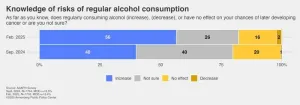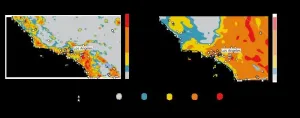(Press-News.org) PHILADELPHIA – Public awareness of the link between drinking alcohol and an elevated risk of cancer has grown since last fall, with more than half of Americans now saying that regularly consuming alcohol increases your chances of later developing cancer, according to a survey by the Annenberg Public Policy Center (APPC) of the University of Pennsylvania.
In the survey, conducted Jan. 30-Feb. 10, 2025, with over 1,700 U.S. adults, 56% say the regular consumption of alcohol increases your chances of later developing cancer, up from 40% in an Annenberg survey in September 2024. The percentage of those who say alcohol consumption has no effect on your chances of later developing cancer fell to 16% from 20% in September 2024, and fewer are not sure how alcohol consumption affects cancer risks (26%, down from 40%).
The survey was fielded less than a month after U.S. Surgeon General Dr. Vivek Murthy’s advisory on alcohol and cancer risk on Jan. 3, 2025. It called for updated warning labels on alcoholic beverage containers to indicate that drinking alcohol carries an increased risk for at least seven types of cancer, including breast, colon, and liver cancer.
The Surgeon General’s warning, which was widely covered in the news media, was not the only report issued on alcohol and cancer in recent months, but the survey found it was the only one to gain significant public awareness. Of the people who say they had “read or heard about” one or more recent reports on the impact of alcohol on health, nearly 3 in 10 (29%) say they would be less likely to accept an alcoholic drink on a social occasion if one is offered to them.
“Our data suggest that the Surgeon General’s synthesis of the science showing that alcohol consumption increases one’s risk of cancer got traction,” said Kathleen Hall Jamieson, director of the Annenberg Public Policy Center. “The Surgeon General’s impact is a reminder that what health officials communicate about science can affect behavior.”
Reports on alcohol consumption and health
Nearly half of our survey respondents (48%) say they had “read or heard about” one or more reports on the impact of alcohol on health. In a separate question, 46% of those who say they were exposed to at least one report say the report they knew about was the Surgeon General’s, though 44% were unsure which report they had encountered.
In its own report in December 2024, the National Academies of Sciences, Engineering, and Medicine (NASEM) reviewed the scientific evidence on the relationship between moderate alcohol consumption and health impacts, including mortality, cancer, weight, and cardiovascular disease. While this report noted the connection between moderate alcohol consumption and a higher risk of breast cancer, it listed positive and negative findings about alcohol consumption and various other health conditions. Another federal report from U.S. health agencies, led by the Substance Abuse and Mental Health Services Administration, on Jan. 14, 2025, found that even moderate drinking carried health risks, including liver disease, cancer, and injuries.
The survey found that very few among the public say they knew of those other reports.
After noting that moderate alcohol use is defined as one drink a day for women and up to two drinks a day for men, the survey asked those who had seen or heard of only one report what it says about moderate alcohol use. Nearly half of those individuals (47%) say that, according to the report, moderate alcohol use “has harmful effects” and a quarter (25%) say it has some harmful and some positive health effects. One in 5 (20%) were not sure what the report says.
Did the reports have an effect?
The respondents who knew of at least one report on alcohol and health were asked if “anything that you have heard or read about the report(s)” made you more or less likely to accept a drink if one is offered on a social occasion, or if it had no effect. As noted above, nearly 1 in 3 (29%) say they would be less likely to accept an alcoholic drink if one is offered. But 61% say the report(s) would have no effect on whether they would accept an alcoholic drink. A very small group (9%) say they would be more likely to accept a drink.
Among the small group who report that something they heard or read about the report(s) made them more likely to accept a drink on a social occasion, most (73%) say they also would be more likely to accept a second drink if one is offered. About 1 in 5 (22%) say they’d be less likely to accept a second drink if offered.
APPC’s Annenberg Science and Public Health knowledge survey
The survey data come from the 23rd wave of a nationally representative panel of 1,716 U.S. adults conducted for the Annenberg Public Policy Center by SSRS, an independent market research company. Most have been empaneled since April 2021. To account for attrition, small replenishment samples have been added over time using a random probability sampling design. The most recent replenishment, in September 2024, added 360 respondents to the sample. This wave of the Annenberg Science and Public Health Knowledge (ASAPH) survey was fielded Jan. 30-Feb. 10, 2025. The margin of sampling error (MOE) is ± 3.4 percentage points at the 95% confidence level. All figures are rounded to the nearest whole number and may not add to 100%. Combined subcategories may not add to totals in the topline and text due to rounding.
Download the topline and the methods report.
The policy center has been tracking the American public’s knowledge, beliefs, and behaviors regarding vaccination, Covid-19, flu, RSV, and other consequential health issues through this survey panel for four years. In addition to Jamieson, APPC’s team on the survey includes research analysts Laura A. Gibson and Shawn Patterson Jr., Patrick E. Jamieson, director of the Annenberg Health and Risk Communication Institute, and Ken Winneg, managing director of survey research.
See other Annenberg health knowledge surveys:
Raw milk and bird flu: With bird flu in raw milk, many still do not know risks of consuming it (March 14, 2025)
Firearm safety: Over 1 in 3 adults in households with guns do not store all in locked locations (March 11, 2025)
Low-dose aspirin: Nearly half of adults mistakenly think benefits of daily aspirin outweigh risks (Feb. 3, 2025)
Vaccination mandates: Most Americans favor school vaccination requirements, but support is rising for opt-out options (Jan. 28, 2025)
The RSV vaccine & vaccine hesitancy: Greater acceptance of RSV vaccine seen as vaccine hesitancy appears to have plateaued (Dec. 23, 2024)
The Annenberg Public Policy Center was established in 1993 to educate the public and policy makers about communication’s role in advancing public understanding of political, science, and health issues at the local, state, and federal levels. Connect with us on Facebook, X, Instagram, and Bluesky.
END
Awareness grows of cancer risk from alcohol consumption, survey finds
After Surgeon General warning, some say they’re less apt to accept a social drink
2025-04-01
ELSE PRESS RELEASES FROM THIS DATE:
The experts that can outsmart optical illusions
2025-04-01
Medical imaging experts are adept at solving common optical illusions, according to research from four UK universities, including the University of East Anglia.
The correct analysis of medical images from scans, such as MRI, is critical for diagnosing cancer and many other conditions.
A new study published today shows that people who do this professionally are also more accurate at judging the size of objects in common optical illusions.
In other words, medical imaging experts also literally see better in everyday life!
The research is also the ...
Pregnancy may reduce long COVID risk
2025-04-01
Pregnancy may offer some protection from developing Long COVID, found a new study led by Weill Cornell Medicine, University of Rochester Medical Center, University of Utah Health and Louisiana Public Health Institute. Previous research has mostly focused on non-pregnant adults affected by Long COVID— a condition lasting for months after a person recovers from SARS-CoV-2 infection.
The study, published April 1 in Nature Communications, helps fill a critical gap about Long COVID in women infected with SARS-CoV-2 ...
Scientists uncover novel immune mechanism in wheat tandem kinase
2025-04-01
Wheat is grown over more land area than any other food crop. Among pathogen-driven threats to wheat, fungi top the list, causing billions of dollars of losses each year and posing a serious challenge to food security worldwide.
In an effort to combat this problem, a research team led by Prof. LIU Zhiyong from the Institute of Genetics and Developmental Biology of the Chinese Academy of Sciences, together with collaborators, has uncovered a novel immune mechanism by which tandem kinase proteins (TKPs) combat pathogen invasion in wheat.
TKPs are a recently discovered class of disease resistance proteins in wheat and barley. Characterized by two or more tandemly arranged ...
Three University of Virginia Engineering faculty elected as AAAS Fellows
2025-04-01
Faculty representing three disciplines in the University of Virginia School of Engineering and Applied Science — computer science, mechanical and aerospace engineering, and civil and environmental engineering — have been elected to the rank of fellow by the American Association for the Advancement of Science.
The AAAS is one of the world’s largest general scientific societies and publisher of the Science family of journals. UVA Engineering’s faculty are among 471 scientists and engineers named in the class of 2024, according to the AAAS.
Fellows are selected ...
Unintentional drug overdoses take a toll across the U.S. unequally, study finds
2025-04-01
A recent study from Columbia University’s Mailman School of Public Health reveals significant racial and sex disparities in drug overdose mortality rates. The research found that both Black men and Black women have been disproportionately impacted by overdose deaths, with their mortality rates rising sharply compared to their White counterparts. This study expands scientific understanding of how race, sex, and regional factors intersect to affect overdose outcomes. The study's findings are published ...
A step toward plant-based gelatin
2025-04-01
WASHINGTON, April 1, 2025 – With increased awareness about food sources and their environmental impacts, replacing animal-derived products in food and drugs is a significant research area. One common — but often overlooked — animal protein is gelatin, found everywhere from candy to plastic-free packaging.
In Physics of Fluids, by AIP Publishing, researchers from the University of Ottawa present gum tragacanth as a plant-based alternative to gelatin for creating edible films.
“Gelatin has ...
ECMWF unveils groundbreaking ML tool for enhanced fire prediction
2025-04-01
The ability to predict wildfires - such as those that recently devastated Los Angeles and Canada - is advancing rapidly with the help of ML–driven high-quality data. A new paper, published today (Tuesday 1 April, 16:00 BST | https://www.nature.com/articles/s41467-025-58097-7) in Nature Communications, highlights how the collection and integration of higher-quality data can significantly improve the accuracy and reliability of wildfire predictions.
The paper evaluates how ECMWF's new data-driven fire danger forecasting model, the Probability of Fire (PoF), performed in 2023 and in recent extreme events. ECMWF has been producing fire ...
The food and fuel that farms itself
2025-04-01
Under the right conditions, duckweed essentially farms itself. Wastewater, ponds, puddles, swamps—you name it. If there’s enough sunlight and carbon dioxide, the aquatic plant can grow freely. But that’s not all that makes it intriguing. Packed inside duckweed’s tiny fronds is enormous potential as a soil enricher, a fuel source, protein-rich foods, and more. New findings at Cold Spring Harbor Laboratory (CSHL) could help bring all that potential to life.
CSHL Professor and HHMI Investigator Rob Martienssen and Computational Analyst Evan Ernst started working with duckweed over 15 years ago. They see their latest research as one of the most important ...
Patient- and Community-Level Characteristics Associated With RSV Vaccination
2025-04-01
About The Study: Knowledge of respiratory syncytial virus (RSV) disease and RSV vaccine eligibility was low in this cross-sectional study of hospitalized adults. Older adults and those with certain medical conditions were more likely to have received vaccine, suggesting appropriate prioritization, but sociodemographic differences in vaccine uptake occurred.
Corresponding Author: To contact the corresponding author, Diya Surie, MD, email dsurie@cdc.gov.
To access the embargoed study: Visit our For The Media website at this link https://media.jamanetwork.com/
(doi:10.1001/jamanetworkopen.2025.2841)
Editor’s ...
Intersectional Racial and Sex Disparities in Unintentional Overdose Mortality
2025-04-01
About The Study: In this cross-sectional study of overdose deaths, disparities in overdose mortality were evident, with Black men and Black women experiencing a pronounced and increasing burden of mortality compared with their white counterparts. Addressing these disparities will require a multipronged approach targeting the social, physical, economic, and policy risk environments.
Corresponding Author: To contact the corresponding author, Kechna Cadet, PhD, MPH, email kc3010@cumc.columbia.edu.
To access the embargoed study: Visit our For The Media website at this link https://media.jamanetwork.com/
(doi:10.1001/jamanetworkopen.2025.2728)
Editor’s ...
LAST 30 PRESS RELEASES:
GLP-1 drugs associated with reduced need for emergency care for migraine
New knowledge on heritability paves the way for better treatment of people with chronic inflammatory bowel disease
Under the Lens: Microbiologists Nicola Holden and Gil Domingue weigh in on the raw milk debate
Science reveals why you can’t resist a snack – even when you’re full
Kidney cancer study finds belzutifan plus pembrolizumab post-surgery helps patients at high risk for relapse stay cancer-free longer
Alkali cation effects in electrochemical carbon dioxide reduction
Test platforms for charging wireless cars now fit on a bench
$3 million NIH grant funds national study of Medicare Advantage’s benefit expansion into social supports
Amplified Sciences achieves CAP accreditation for cutting-edge diagnostic lab
Fred Hutch announces 12 recipients of the annual Harold M. Weintraub Graduate Student Award
Native forest litter helps rebuild soil life in post-mining landscapes
Mountain soils in arid regions may emit more greenhouse gas as climate shifts, new study finds
Pairing biochar with other soil amendments could unlock stronger gains in soil health
Why do we get a skip in our step when we’re happy? Thank dopamine
UC Irvine scientists uncover cellular mechanism behind muscle repair
Platform to map living brain noninvasively takes next big step
Stress-testing the Cascadia Subduction Zone reveals variability that could impact how earthquakes spread
We may be underestimating the true carbon cost of northern wildfires
Blood test predicts which bladder cancer patients may safely skip surgery
Kennesaw State's Vijay Anand honored as National Academy of Inventors Senior Member
Recovery from whaling reveals the role of age in Humpback reproduction
Can the canny tick help prevent disease like MS and cancer?
Newcomer children show lower rates of emergency department use for non‑urgent conditions, study finds
Cognitive and neuropsychiatric function in former American football players
From trash to climate tech: rubber gloves find new life as carbon capturers materials
A step towards needed treatments for hantaviruses in new molecular map
Boys are more motivated, while girls are more compassionate?
Study identifies opposing roles for IL6 and IL6R in long-term mortality
AI accurately spots medical disorder from privacy-conscious hand images
Transient Pauli blocking for broadband ultrafast optical switching
[Press-News.org] Awareness grows of cancer risk from alcohol consumption, survey findsAfter Surgeon General warning, some say they’re less apt to accept a social drink







